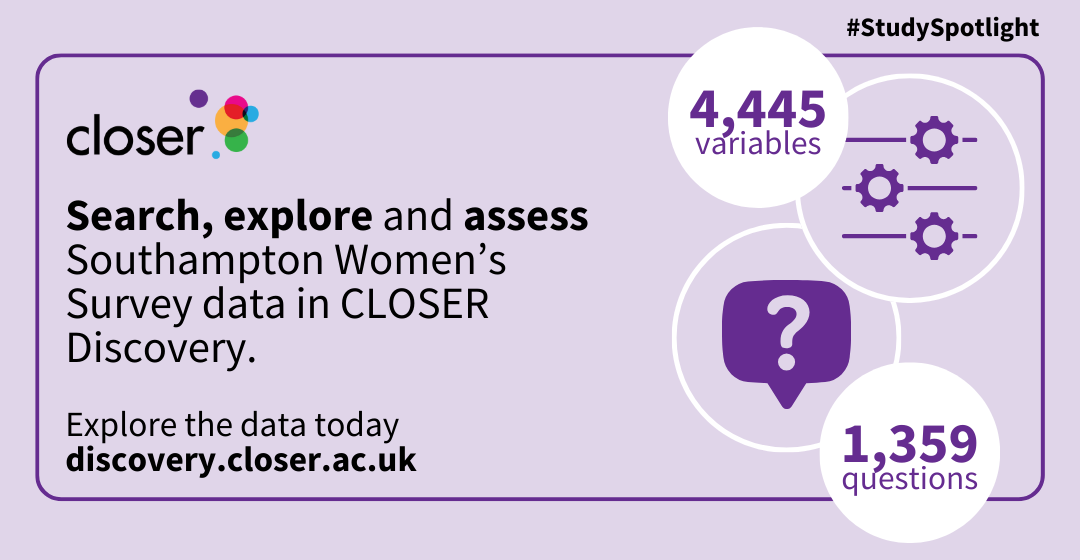 For our latest Study Spotlight, we’re heading to the south coast of England for an in-depth look at the Southampton Women’s Survey (SWS).
For our latest Study Spotlight, we’re heading to the south coast of England for an in-depth look at the Southampton Women’s Survey (SWS).
About the study
Funded by the Medical Research Council, the University of Southampton and several other funders, the SWS is the one of very few birth cohorts in which mothers were recruited before conception of the child. The SWS aims to assess the influence of maternal dietary, lifestyle, intrauterine, genetic and epigenetic factors on the children’s health and development, and on the health of the mothers themselves.
Between 1998 and 2002, the study recruited 12,583 women aged 20-34 years living in Southampton. Of these, 3,158 women were followed throughout their pregnancy and went on to have liveborn singleton infants who form the child cohort of the SWS.
The mothers received ultrasound scans at 11, 19 and 34 weeks of pregnancy and their babies were measured soon after birth. The survey has since followed up with these children with home visits when they were aged 6 months, 12 months, 2 years, and 3 years. A sample of children were also surveyed at 4 years, 6-7 years, 8-9 years, 11-13 years, and, most recently, 17-19 years.
Recent research using the study has investigated blood pressure measurement and adverse pregnancy outcomes, as well as longitudinal dietary trajectories from pre-conception to mid-childhood in women and children.
You can find out more information about the study from the SWS lead, Professor Janis Baird in our video introducing SWS from a social science perspective.
Discover the data
 If you’re interested in using data from SWS to carry out your own longitudinal research, you might be asking where and how to find out exactly what data has already been collected. That’s where our comprehensive Discovery research tool can help!
If you’re interested in using data from SWS to carry out your own longitudinal research, you might be asking where and how to find out exactly what data has already been collected. That’s where our comprehensive Discovery research tool can help!
Discovery enables you to search, explore and assess SWS study data in an unprecedented level of detail. When you filter your search to look solely at SWS metadata, you’ll find a wealth of contextual information about 4,445 variables and 1,359 questions from the study.
These metadata cover a range of research topics including physical and mental health, healthcare behaviour, child development, family and social networks, pregnancy, and more.
Response to the COVID-19 pandemic
In response to the COVID-19 pandemic, SWS ran a survey to track the study’s mothers’ and their children’s experiences of the pandemic and lockdown. The survey included questions on mental health, health behaviours, and self-efficacy. We plan to add the metadata from this survey to Discovery in a future content update – watch this space!
Opportunities for cross-study comparisons
 Cross-study analysis helps us understand more about group differences, the role of contextual factors and how societal changes may impact on outcomes for individuals.
Cross-study analysis helps us understand more about group differences, the role of contextual factors and how societal changes may impact on outcomes for individuals.
To help researchers carry out their own cross-study comparisons, we’ve created a series of easily searchable cross-study data guides focused on three different areas of research. With our guide to dietary measures and estimated nutrient intake information, you can examine detailed information about the relevant data collected in the Southampton Women’s Survey alongside seven other longitudinal population studies.
Scratching the surface
This spotlight is only a whistle-stop tour of the Southampton Women’s Survey and how you can use the study in your own research. As the study continues, we look forward to seeing what’s next on its horizon and continuing our work with this unique study.
You can keep up to date with all the latest developments on SWS and the longitudinal research community, sent direct to your inbox, via our monthly newsletter, Longitudinal News.
Further information
This blog is part of our ‘Study Spotlight’ series. This series showcases the CLOSER partner studies, demonstrating how to make the most of these valuable assets through our research resources. Every month, we turn the spotlight on a new theme, producing a series of blogs that delve into the backgrounds of studies that share similar characteristics, such as their study sample, design, or topics of research interest.
‘Study Spotlight’ helps you gain a deeper understanding of the studies in our partnership and how you can better utilise these on your research journey.
Keep an eye out next month as we conclude our Study Spotlight series with blogs exploring the Health and Employment After Fifty Study, the Wirral Child Health and Development Study, and the Whitehall II study.
Previous Study Spotlight blogs:
- ALSPAC and the millennial generation (April 2023)
- Next Steps and the millennial generation (April 2023)
- ELSA and the ageing population (May 2023)
- Hertfordshire Cohort Study and the ageing population (May 2023)
- MRC NSHD and the ageing population (May 2023)
- MCS and the British birth cohorts (June 2023)
- BCS70 and the British birth cohorts (June 2023)
- NCDS and the British birth cohorts (June 2023)
- Understanding Society: The UK Household Longitudinal Study (July 2023)
- ONS Longitudinal Study(July 2023)
- Back at school with Growing Up in Scotland(September 2023)
- Generation Scotland(October 2023)
- Northern Ireland Cohort for the Longitudinal Study of Ageing(January 2024)
- Born in Bradford – can a research project change a city?(February 2024)
- Longitudinal Study of Young People in England: Cohort 2 (March 2024)
On Twitter? Follow #StudySpotlight to keep up to date with the series throughout the year.
Related links:
